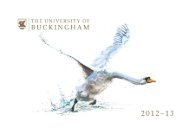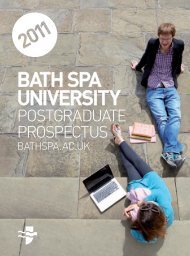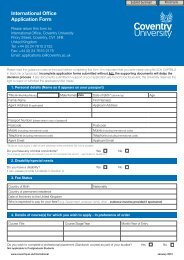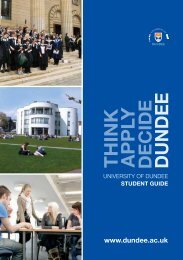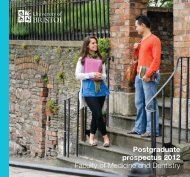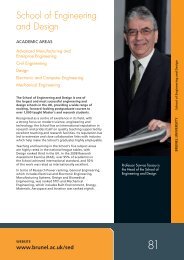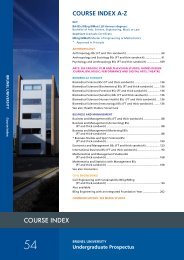www.swansea.ac.uk Postgraduate Prospectus 2012
www.swansea.ac.uk Postgraduate Prospectus 2012
www.swansea.ac.uk Postgraduate Prospectus 2012
- No tags were found...
You also want an ePaper? Increase the reach of your titles
YUMPU automatically turns print PDFs into web optimized ePapers that Google loves.
PSYCHOLOGYUnlocking the secrets of the human mind is one ofmodern science’s greatest challenges. Psychology, thestudy of human behaviour, helps us to make sense ofhow we understand the world, what makes us laugh orcry, why we are conscious, and why we make thechoices we do.Psychology at Swansea benefits from an extensive laboratorysp<strong>ac</strong>e, excellent f<strong>ac</strong>ilities, and good links with hospitals andeducation. The Department is a member of the Welsh Institute ofCognitive Neuroscience and is <strong>ac</strong>credited by the ESRC asa postgraduate training outlet.These degrees will:• prepare you for a research degree• help you to gain transferable skills, including team working,communication, presentation, and analytical skills• equip you with skills relevant for a rewarding career in a rangeof diverse roles, including te<strong>ac</strong>hing, nursing, personnelmanagement, and consultancy.MSc Abnormal and Clinical PsychologyThis MSc programme is designed to equip students with anadvanced understanding of issues relating to the theory andpr<strong>ac</strong>tice of psychology in healthcare settings.The course does not provide a professional qualification, but willhelp prepare students who intend applying for professionaltraining courses in clinical psychology. Applicants should beaware that in addition to further <strong>ac</strong>ademic study, experience ofworking with relevant client groups will be beneficial whenapplying for professional training.Course modules include:• Applied Behaviour Analysis• Psychosis• Eating Disorders• Affective/Somataform Disorders• Personality and Sexual Disorders• Psychotherapy• Neuropsychology• Psychopharm<strong>ac</strong>ology for Clinical Psychologists• Causes and Coping with Chronic Disease• Statistics and Research Design.MSc Research Methods in PsychologyThe aim of this programme is to providestudents with the advanced training inresearch methods that will prepare themfor a career involving psychologicalresearch, which can include any of theprofessional areas of psychology.Training is provided in all relevant skills,including reviewing literature, developinghypotheses, writing research proposals,designing and carrying out empiricalstudies, conducting advanced statistical andqualitative analyses, and presenting results.Students learn to use a range of researchtools, such as databases, statisticalsoftware and computer-assisted qualitativeanalysis p<strong>ac</strong>kages.On completion of the programme, studentshave <strong>ac</strong>quired a wide range of pr<strong>ac</strong>ticalpsychology research skills and anunderstanding of the nature and limitationsof the scientific method and the mainalternatives. In addition, they will haveknowledge of a range of generalhistorical, theoretical, and philosophicalissues underlying the discipline ofpsychology, including the philosophyof science.MSc Cognitive NeuroscienceCognitive Neuroscience is at theintersection of cognitive science, brainimaging, and clinical neuroscience. It isone of the most significant areas ofcontemporary science and it is beginningto transform our understanding of bothnormal and damaged brain function.The course will equip students with theskills necessary for careers in cognitiveneuroscience, enable them to <strong>ac</strong>quireexperience and expertise in experimentaldesign, advanced statistical analysis andevaluation of research in differentdisciplines within cognitive neuroscience. Itwill also enhance their knowledge andunderstanding of the core areas ofcommon concern in cognitiveneuroscience, including attention, vision,memory and language, and the strategyof cross-disciplinary research in theoryand application development.It will also equip students with criticalevaluative and analytical skills foraddressing their own and others researchwithin cognitive neuroscience, includingassessing theory and methodology througha range of communication and audiovisualstrategies134135MASTER'S DEGREES – PSYCHOLOGYEntry requirementsFor MSc Abnormal and Clinical Psychology aminimum of a 2.1 degree in Psychology is requiredfor entry to the course.For MSc Research Methods in Psychology aminimum of a 2.2 degree in Psychology or arelated discipline is required.For MSc Cognitive Neuroscience an appropriatedegree or its equivalent from an approvedinstitution (preferably 2.2 or above) and evidenceof recent <strong>ac</strong>ademic study OR to be able to satisfySwansea University entry requirements fornon-standard entry students.English Language requirement:IELTS 6.5 (with a minimum of 5.5 in e<strong>ac</strong>hcomponent and 6.5 in writing) or SwanseaUniversity recognised equivalent.Scholarships and BursariesA range of postgraduate scholarships and bursaries is available. Fordetails, please visit <strong>www</strong>.<strong>swansea</strong>.<strong>ac</strong>.<strong>uk</strong>/scholarships/<strong>Postgraduate</strong>How the degrees are structuredThe MSc programmes are delivered through a combination of seminars,small group lectures and pr<strong>ac</strong>tical classes. For full details of the range ofcompulsory and optional modules available, please cont<strong>ac</strong>t theAdmissions Tutor.AssessmentAssessment for the MSc Abnormal and Clinical Psychology is by writtencoursework, examination, and a research thesis on a topic related toclinical psychology.The MSc Research Methods in Psychology is assessed primarily bywritten coursework, and reports of empirical projects carried outindividually and in groups.The MSc Cognitive Neuroscience is assessed by formal taught sessions;small group work using <strong>ac</strong>tion-based learning appro<strong>ac</strong>hes; studentpresentations; written assignments including essays; conference posterpresentations; PowerPoint presentations and empirical projects.Further informationWebsite:<strong>www</strong>.<strong>swansea</strong>.<strong>ac</strong>.<strong>uk</strong>/humanandhealthsciencesCont<strong>ac</strong>t:Email: e.k.gregory@<strong>swansea</strong>.<strong>ac</strong>.<strong>uk</strong>Tel: +44 (0)1792 513023For Cognitive Neuroscience:Email: T.J.Lloyd-Jones@<strong>swansea</strong>.<strong>ac</strong>.<strong>uk</strong>Tel: +44 (0) 1792 602420Visit the University: see page 182 for detailsApplications can be made online at:<strong>www</strong>.<strong>swansea</strong>.<strong>ac</strong>.<strong>uk</strong>/applyonline– see pages 184 – 185 for further informationFor details of the research degrees available inPsychology, please see page 72.MASTER'S DEGREES – PSYCHOLOGY




